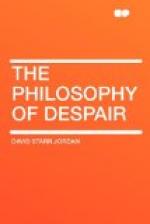The life of man is dynamic, not static; not a condition but a movement. “Not enjoyment and not sorrow” is its end or justification. It is a rush of forces, an evolution towards greater activities and higher adjustment, the growth of a stability which shall be ever more unstable. This onward motion is recognized in the pessimistic philosophy of Von Hartmann, as a movement towards ever greater possibilities of pain. With him life is “the supreme blunder of the blind unconscious force” which created man and developed him as the prey of ever-increasing suffering.
But the power to enjoy has grown in like degree, and both joy and pain are subordinated to the power to act. The human will, the power to do, is the real end of the stress and struggle of the ages. However limited its individual action, the will finds its place among the gigantic factors in the evolution of life. It is not the present, but the ultimate, which is truth. Not the unstable and temporary fact but the boundless clashing forces which endlessly throw truths to the surface.
Another source of Pessimism is the reaction from unearned pleasures and from spurious joys. It is the business of the senses to translate realities, to tell the truth about us in terms of human experience. Every real pleasure has its cost in some form of nervous activity. What we get we must earn, if it is to be really ours. Long ago, in the infancy of civilization, man learned that there were drugs in Nature, cell products of the growth or transformation of “our brother organisms, the plants,” by whose agency pain was turned to pleasure. By the aid of these outside influences he could clear “today of past regrets and future fears,” and strike out from the sad “calendar unborn tomorrow and dead yesterday.”
That the joys thus produced had no real objective existence, man was not long in finding out, and it soon appeared that for each subjective pleasure which had no foundation in action, there was a subjective sorrow, likewise unrelated to external things.
But that the pains more than balanced the joys, and that the indulgence in unearned deceptions destroyed sooner or later all capacity for enjoyment, man learned more slowly.
The joys of wine, of opium, of tobacco and of all kindred drugs are mere tricks upon the nervous system. In greater or less degree they destroy its power to tell the truth, and in proportion as they have seemed to bring subjective happiness, so do they bring at last subjective horror and disgust. And this utter soul-weariness of drugs has found its way into literature as the expression of Pessimism.
“The City of the Dreadful Night,” for example, does not find its inspiration in the misery of selfish, rushing, crowded London. It is the effect of brandy on the sensitive mind of an exquisitive poet. Not the world, but the poet, lies in the “dreadful night” of self-inflicted insomnia. Wherever these subjective nerve influences find expression in literature it is either in an infinite sadness, or in hopeless gloom. James Thompson says in the “City of the Dreadful Night”:




